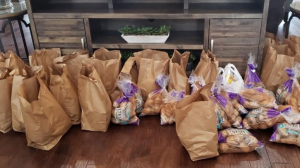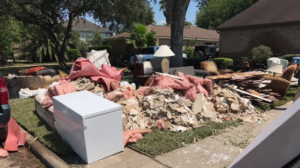The Role of Resilience in February’s Winter Freeze

Photo: Creating a walkway for food distribution. Church of the Resurrection, Texas, February 2021.
“We lost power and so we sat in the cold and dark,” said Kécia McBride, program manager for the Episcopal Diocese of Texas (EDOT) Harvey Recovery program, when describing the devastating February winter storm in the southern US. Millions like Kécia lost power and struggled to keep themselves warm inside houses unequipped for record low temperatures. Families huddled together inside sleeping bags using their bodies for insulation and soon realized that their fireplaces were not meant to replace furnaces. For two to three weeks after the storm, she added, “Even when it finally warmed up, I felt a chill down to my bones.”
The region, more accustomed to hurricanes, tornadoes and heat waves, was unprepared for infrastructure design failures caused by the deep freeze. What transpired was a food and clean water crisis, with boil-water notices lasting for weeks. Communication systems were down and there were feelings of isolation and fear en masse. During the storm, Kécia went into her hurricane preparedness kit and grabbed her hand-crank radio, finding a bit of comfort in being able to connect to other people in that way.
“It felt like we didn’t have anything we needed, and we needed it all of a sudden,” said Jennifer Wickham, an Episcopal Relief & Development Partner in Response and a Diocesan Disaster Coordinator for the Episcopal Diocese of West Texas. Jennifer and her neighbors helped each other in the immediate days after the storm. They discovered needs by word-of-mouth and then shared water rations and pooled money together for hotel rooms for those with damage in their homes.
As soon as Episcopal Relief & Development was able to contact our partners in affected dioceses, we supported them in providing shelter and hot meals to their wider communities in western Texas including the greater Houston area, Waco, Austin, Dallas and Fort Worth. In Louisiana, we partnered with communities in Shreveport, Bossier City and Natchitoches. We also helped them to distribute supplies so families could fix broken water pipes, clean their clothes and restock their refrigerators.

Unfortunately, our partners in the South are no strangers to disasters. Climate-influenced events are becoming more frequent and more deadly. Hurricanes Harvey, Maria and Irma, a triad of major hurricanes that hit Florida, Texas, Puerto Rico and the Virgin Islands just weeks apart, made landfall only three years ago. The three storms have caused over $200 billion in damages that vulnerable communities are still recovering from. Since then, the Gulf Coast, where some of our partners that were affected by the recent winter storms live, have experienced catastrophic hurricanes Michael (2018) and Laura (2020). Smaller, but still damaging storms like Imelda (2019), Hanna (2020), Sally (2020), Delta (2020) and Zeta (2020), set back long-term recovery efforts, too.
February’s category three level winter storm took place after a long year of responding to the continuing COVID-19 pandemic. Both of these significant events not only elongated the Harvey recovery process but also emotionally took a toll on the clergy, counselors, case managers and other community leaders we partner with and their communities. For instance, the Rev. Stacy Stringer sought an outlet to release the stress she accumulated in her body from the past three years. The director for the EDOT Harvey Recovery program learned meditative practices that were useful during the recent winter storm. Learning how to deal with stress in a healthy way allows her to continue to do this challenging work.

We celebrate the people who lead our preparedness, relief and recovery efforts in the US for their faithfulness. Within their dioceses, our partners have laid the foundation for resilience since Harvey, which is why they were able to shift from hurricane recovery toward winter storm relief so quickly. The systems and relationships they’ve established over the years are the “lasting change” we speak about.
Our partners have a ministry of presence with marginalized communities that face income and housing inequality, racism and discrimination. They are there for people who fear shelters, families who face food insecurity and heightened violence, and for children who are constantly exposed to frightening news. It is their compassion and zeal that move their communities onward, even as the work, and trauma, keeps piling on.
Please continue to pray for our partners as they heal and work to restore hope back into their communities after each disaster. Donations can be made to the US Disaster Response Fund to support the ongoing recovery. Your prayers and contributions are working.



